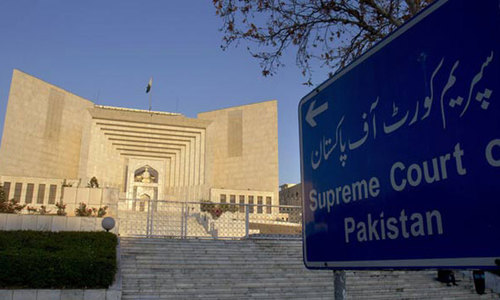As the Supreme Court's hearing of the Panamagate case resumed on Tuesday, the bench inquired into the investigative steps that were taken by the National Accountability Bureau (NAB) and the Federal Board of Revenue after the matter surfaced last year.
Presenting himself before a five-member larger bench of the apex court, FBR Chairman Muhammad Irshad told the court that notices were issued to 343 individuals following the Panama Papers leaks.
"The owners of 39 companies are not Pakistani residents and 59 people denied ownership of offshore companies," the chairman elaborated.
Irshad told the court that Prime Minister Nawaz Sharif's sons Hasan and Hussain Nawaz as well as his daughter Maryam had responded to the notices issued to them by the bureau in November 2016.
Elaborating on the responses of the premier's children, the chairman told the court that Maryam had denied having property abroad and being the owner of any off-shore company.
The court asked whether her response mentioned that she was the trustee of four flats located in London's upscale Park Lane neighbourhood. The chairman responded that she did not.
In the previous hearing of the case on Thursday, Advocate Salman Akram Raja, representing Hasan and Hussain Nawaz, told the apex court that the London flats had rested with Maryam for six months — between February and July 2006.
Raja told the court that a trust deed was executed between Maryam and Hussain in February 2006, following which she acted as a trustee for her brother.
Irshad also told the court that in a response submitted to the FBR, Hussain Nawaz had stated that he had resided in Saudi Arabia since 2000.
Responding to which, Justice Gulzar angrily asked the chairman if he had closed Hussain's file after the premier's son submitted his response.
"What steps did you take after receiving the responses?" Justice Khosa, who presides over the bench, asked the chairman.
The chairman's response invoked the bench's ire when he said the FBR was "verifying all the information provided by the respondents".
"It seems that you may need 30 years to verify those documents," Justice Gulzar remarked.
"You have wasted a year doing a task that should have taken hours," Justice Saeed commented.
The lawyer representing the FBR then admitted before the court that no immediate steps were taken. He argued that separate laws and institutions are available for money laundering cases.
"So in other words, what you are saying is that the FBR did not take any steps regarding money laundering," Justice Gulzar observed.
Court disappointed by NAB's position
Appearing before the apex court, NAB Chairman Qamar Zaman Chaudhry said the bureau "is aware of its responsibilities".
"NAB's position has remained that Panama [Papers case] does not come within its jurisdiction," Justice Khosa observed.
"Is this NAB's position that because no regulator approached them, investigations were not undertaken against off-shore companies?" Justice Saeed asked after Chaudhry explained that the bureau start investigative action when it is approached by a regulator.
"Laws concerning the NAB give it the authority to undertake investigations," Justice Khosa told the chairman.
"It is saddening to hear NAB's position" Justice Gulzar remarked.
"If NAB does not have the authority to investigate, who does?" Justice Ijazul Hassan asked rhetorically.
When Justice Khosa inquired about NAB's actions regarding bank accounts and monetary transactions, the chairman sought to assure the court that "investigations will be undertaken".
"NAB should act as the country's regulator," Justice Gulzar said.
The bench regretted that NAB had not registered an appeal in the Hudaibiya Paper Mills case.
Finance Minister Ishaq Dar had submitted a confessional statement regarding money laundering before a district magistrate in Lahore on April 25, 2000, confessing to involvement in laundering $14.86 million for the Sharif family.
The minister had filed a request for his acquittal from the case after which NAB had not registered any appeals.
"There are reservations regarding NAB's failure to register an appeal," the bench remarked.
"When a criminal gets bail in a case of petty theft, NAB registers an appeal. This is a case worth millions and no appeal was registered," Justice Khosa remarked.
"The decision to appeal is taken in accordance with the prosecutor general's advice. The prosecutor general of NAB had decided that there would be no point in registering an appeal. If an appeal was registered NAB would have been disgraced," the chairman explained.
"Without any pressure, what is your opinion ─ should this case have been appealed?" Justice Khosa asked the chairman. In response, the chairman declared he remains steadfast in the decision not to register an appeal.
"Then be prepared to face serious consequences," Justice Saeed warned.
AG presents arguments
Attorney General Ashtar Ausaf Ali during his arguments said he would provide legal assistance regarding the court's authority.
He said previous court rulings on disqualification could serve as examples to the bench as the petitioners seek the disqualification of the prime minister.
"This is a unique case," the attorney general said.
Justice Saeed told the attorney general that the bench had already reached a decision for the hearing of the requests submitted in the court.
"I will share my opinions regarding the law," the attorney general responded.
"Are you trying to say that the court has the authority but should not use it? Justice Afzal asked
"Authority should be used according to the facts of the case," the attorney general responded.
When Justice Saeed asked the official whether false statements were grounds for disqualification, Ali responded that the court "has to ensure a transparent trial".
"Did the court refuse to hear anyone in this case?" Justice Afzal said.
"It is not about hearing the case, it is about reaching a decision," the attorney general responded.
"It is a matter of tax evasion, the country wants to know who paid how much tax," the bench remarked.
The court asked the attorney general to complete his arguments tomorrow. Meanwhile, Justice Khosa declared that further documents in the Panamagate case will not be accepted.













































